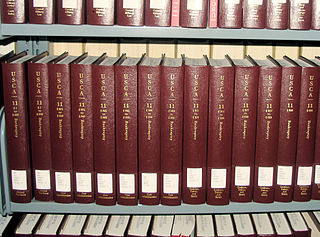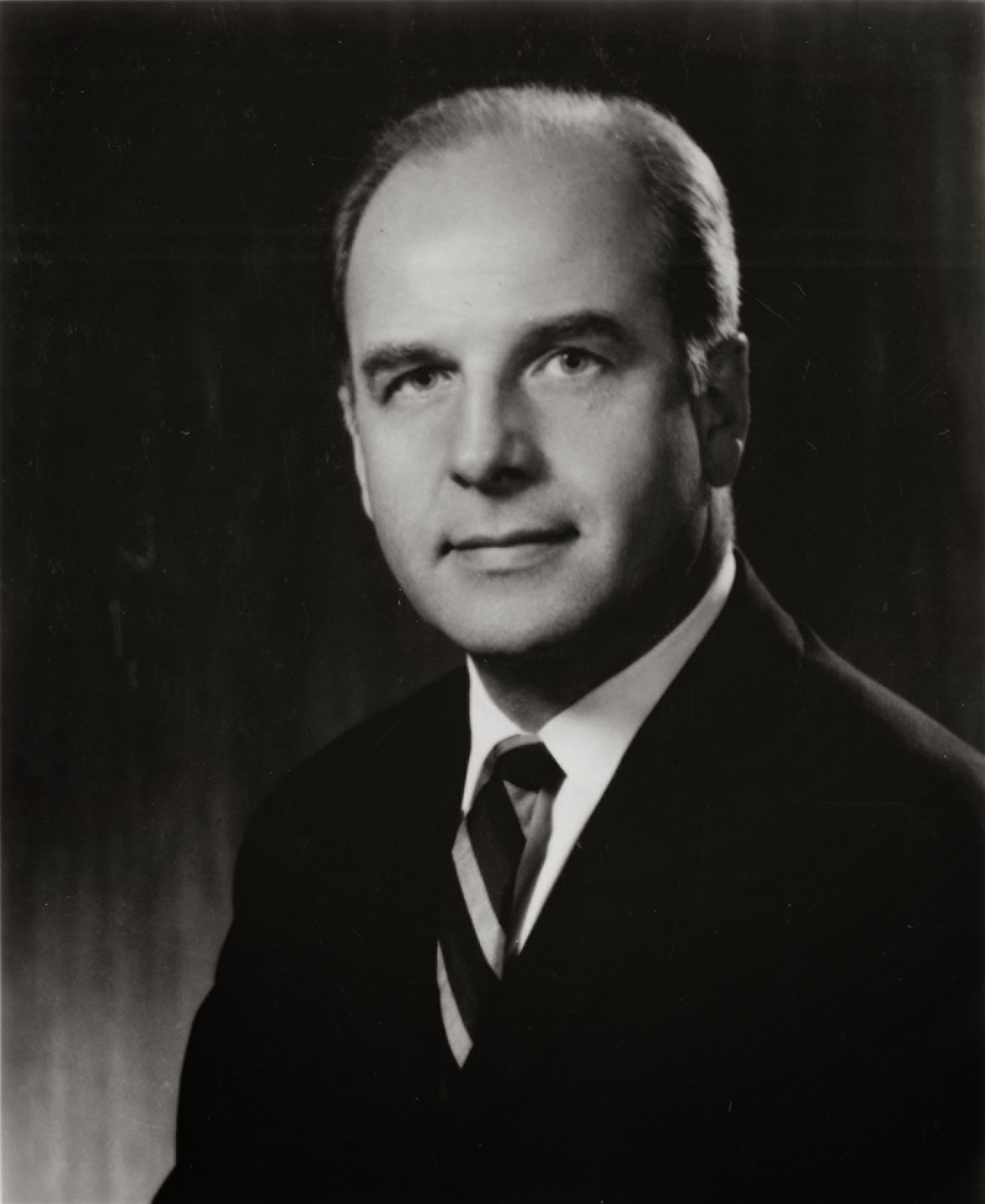
The Code of Laws of the United States of America is the official compilation and codification of the general and permanent federal statutes of the United States. It contains 53 titles. The main edition is published every six years by the Office of the Law Revision Counsel of the House of Representatives, and cumulative supplements are published annually. The official version of those laws not codified in the United States Code can be found in United States Statutes at Large.
Promulgation is the formal proclamation or declaration that a new statutory or administrative law is enacted after its final approval. In some jurisdictions, this additional step is necessary before the law can take effect.
The Economic Stabilization Act of 1970 was a United States law that authorized the President to stabilize prices, rents, wages, salaries, interest rates, dividends and similar transfers. It established standards to serve as a guide for determining levels of wages, prices, etc., which would allow for adjustments, exceptions and variations to prevent inequities, taking into account changes in productivity, cost of living and other pertinent factors.

In the United States, the presidential library system is a nationwide network of 13 libraries administered by the Office of Presidential Libraries, which is part of the National Archives and Records Administration (NARA). These are repositories for preserving and making available the papers, records, collections and other historical materials of every President of the United States from Herbert Hoover to George W. Bush. In addition to the library services, museum exhibitions concerning the presidency are displayed.

The Ninety-third United States Congress was a meeting of the legislative branch of the United States federal government, composed of the United States Senate and the United States House of Representatives. It met in Washington, DC from January 3, 1973, to January 3, 1975, during the end of Richard Nixon's presidency, and the beginning of Gerald Ford's. This Congress was the first Congress with more than two Senate Presidents, in this case, three. After the resignation of Spiro Agnew, Gerald Ford was appointed under the authority of the newly ratified 25th Amendment. Ford became President the next year and Nelson Rockefeller was appointed in his place. The apportionment of seats in the House of Representatives was based on the Nineteenth Census of the United States in 1970. Both chambers had a Democratic majority.

The Archivist of the United States is the official overseeing the operation of the National Archives and Records Administration (NARA). The first Archivist, R.D.W. Connor, began serving in 1934, when the National Archives was established as an independent federal agency by Congress. The Archivists served as subordinate officials of the General Services Administration from 1949 until the National Archives and Records Administration became an independent agency again on April 1, 1985. The position is held by David Ferriero, who was named to the office in 2009.
The Office of the Law Revision Counsel of the United States House of Representatives prepares and publishes the United States Code, which is a consolidation and codification by subject matter of the general and permanent laws of the United States. The Office was created in 1974 when the provisions of Title II, sec. 205, of H. Res. 988, 93rd United States Congress, were enacted by Public Law 93-554, 88 Stat. 1777.

The National Emergencies Act (NEA) is a United States federal law passed to end all previous national emergencies and to formalize the emergency powers of the President.

The Trade Act of 1974 was passed to help industry in the United States become more competitive or phase workers into other industries or occupations.

United States Navy Regulations is the principal regulatory document of the Department of the Navy, endowed with the sanction of law, as to duty, responsibility, authority, distinctions and relationships of various officials, organizations and individuals.

The Non-Detention Act of 1971 was passed to repeal portions of McCarran Internal Security Act of 1950, specifically Title II, the "Emergency Detention Act". The United States statute repealed the Emergency Detention Act of 1950 provisioning the United States Attorney General powers for detention of any American or non-American citizen deemed as a threat to the national security of the United States. The 64 Stat. 1019 statute was codified within Title 50 War and National Defense as 50 U.S.C. ch. 23, subch. II §§ 811-826.
Vice admiral is a three-star commissioned naval officer rank in the United States Navy, the United States Coast Guard, the United States Public Health Service Commissioned Corps, and the National Oceanic and Atmospheric Administration Commissioned Officer Corps, with the pay grade of O-9. Vice admiral ranks above rear admiral and below admiral. Vice admiral is equivalent to the rank of lieutenant general in the other uniformed services.
The Gold Clause Cases were a series of actions brought before the Supreme Court of the United States, in which the court narrowly upheld restrictions on the ownership of gold implemented by the administration of U.S. President Franklin D. Roosevelt in order to fight the Great Depression. The last in this series of cases is notable as the most recent Supreme Court opinion whose outcome was leaked to the press before the official release of its decision. The cases were:
Nixon v. General Services Administration, 433 U.S 425 (1977), is a landmark court case concerning the principle of presidential privilege and whether the public is allowed to view a President's “confidential documents”. The Presidential Recordings and Materials Preservation Act, signed into law by President Gerald Ford in 1974, ordered that the Administrator of General Services obtain President Richard Nixon’s presidential papers and tape recordings. In addition, the Act further ordered that government archivists seize these materials. These archivists would preserve the material deemed historic and return to former President Nixon the materials deemed private. Furthermore, this Act stated that material that was preserved could be used in judicial hearings and proceedings. Immediately after this Act was enacted, Richard Nixon filed a lawsuit in a federal district court claiming that the Act violated the principle of separation of powers, the principle of presidential privilege, Nixon's personal privacy, his First Amendment right of association, and further asserted that it amounted to a constitutionally prohibited Bill of Attainder.

The Enabling Act of 1906, in its first part, empowered the people residing in Indian Territory and Oklahoma Territory to elect delegates to a state constitutional convention and subsequently to be admitted to the union as a single union.
The Independent Safety Board Act (Pub. L. 93−633) is a 1974 law that ended all ties between the National Transportation Safety Board and the U.S. Department of Transportation. It was created to avoid possible conflicts between agencies.













